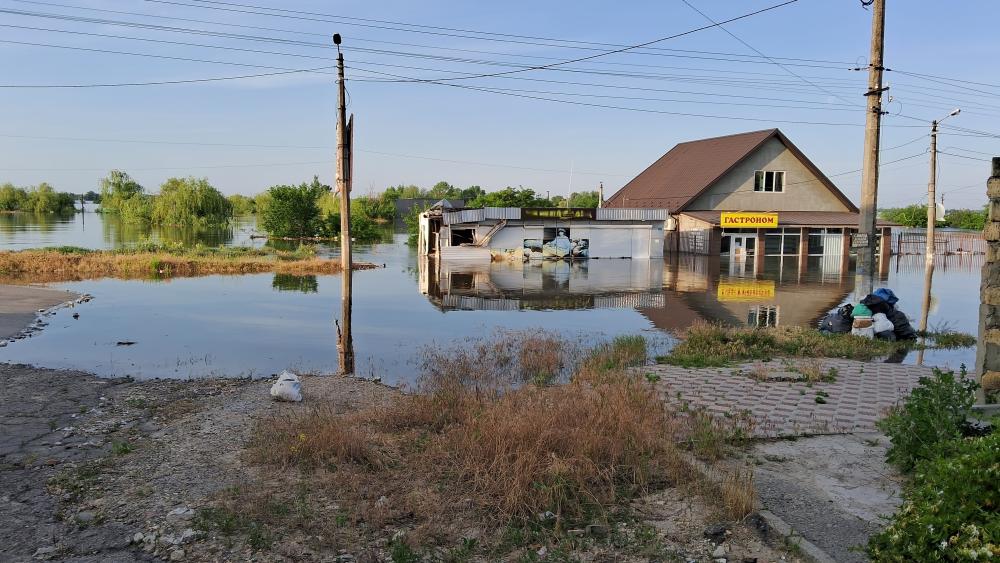
The destruction of the Kakhovka dam is a catastrophe for people and nature. | Photo: Alina Semenenko
Water is increasingly being used as a weapon in armed conflicts, especially in the war of aggression in Ukraine. The detonation of the dam of one of Europe's largest reservoirs is unprecedented in its scale and devastating in its effects.
Eastern Ukraine is one of the most industrialised regions in the world, with an extensive and complex water infrastructure. This includes irrigation systems, drinking water pipelines, sewage systems and pumping stations. These have been systematically and extensively damaged or completely destroyed since the start of the war, in some cases as early as 2014.
The oil pollution caused by the collaps of the Kakhovka dam is dramatic enough in itself. But it gets worse: the spilled oil is not simply diluted and seeped away, but absorbed by living organisms such as plants and animals. As the affected landscape is almost flat and the water can spread far, a huge film of oil is formed. In addition, inundation can lead to the release of pollutants and radionuclear substances deposited at the bottom of the reservoir after the Chernobyl reactor accident in 1986, from military equipment abandoned in the flooded zone and in particular in irrigation channels, pesticides from nearby agricultural fields and industrial plants. Moreover, since the beginning of the war, there have been numerous cases of dumping untreated sewage into the rivers. For the eastern part of Ukraine, a particular problem is also flooding of abandoned subsurface mines leading to pollution of the water resources below and above ground.
This cocktail of toxins will continue to pollute surface and groundwater for decades to come. Pollutants are also being deposited in the soils and sediments and accumulating through the food chain.
At the moment, we lack verifiable data and information to reliably assess the extent of the Kakhovka dam destruction and all its consequences. However, the impact on biodiversity and nature reserves is already dramatic. While large areas upstream are running dry, causing mass mortality of fish and other aquatic organisms, downstream there is widespread flooding, destroying valuable ecosystems of national and international importance. The Dnieper Delta is rich in islands, riparian forests and reed beds - a hotspot of biodiversity. Over 100 of the plant and animal species native to the area are on various Red Lists. In total, an estimated 160,000 birds and more than 20,000 other wild animals are acutely threatened by the destruction of the hydropower plant.
It is considered certain that the consequences will be felt for decades to come, with massive negative impacts on the environment – including the coastal areas of the Black Sea – and the supply of millions of people with clean drinking water as well as water for agriculture and fisheries. Last but not least, the situation poses a threat to global nuclear security.
The wanton destruction of civilian infrastructure contradicts the Geneva Convention. We must therefore do everything possible to prevent even greater damage and to repair the existing damage as quickly as possible. This will be a mammoth task for Ukraine and the international community!
Dr Oleksandra Shumilova and Professor Klement Tockner
Here you can read the press release of 2 March 2023, in which an international team of researchers warned about the impact of the Russian war of aggression on freshwater resources, water infrastructure and the environment in Ukraine.







